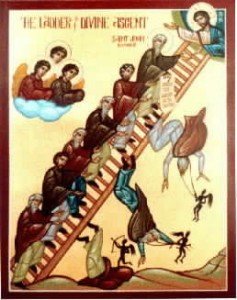 I would finish these thoughts on the sixth step of the Ladder, Remembrance of Death, with these few additional comments.
I would finish these thoughts on the sixth step of the Ladder, Remembrance of Death, with these few additional comments.
When we remember death, life is put into perspective. We will not waste our time on things that are not good and profitable for our souls. We won’t sweat the small stuff, to use a modern idiom. This is why St. John wrote, No one who has acquired the remembrance of death will ever be able to sin. Our worldly desires are mortified when we remember that death is at the door. At the same time we seek all the more urgently to do good. When people know they have only so long to live, they begin to get their affairs in order: they prepare a will to dispose of their things and seek to be reconciled with those they have fallen out with.
The saints lived each day as though it were their last, and so they always sought forgiveness and reconciliation, they gave away their possessions to the poor, and they spurned the pleasures of life.
Thus the remembrance of death does not mean giving up on life, but living life the way we ought to. It pushes us to do good, and it keeps us detached from the things of this world. Thus it liberates us from the shackles of earthly cares.
It has been said that the person who has died to all things remembers death, but whoever holds some ties with the world will not cease plotting against himself.
None of us knows the time of our death, yet we must always be ready for it. If we live as though we are going to die tomorrow, we will be ready. We will carry out God’s teachings every day and will always be prepared for our departure from this world. We can hope that, like the Righteous Symeon, we shall meet our death with hope and joy: Lord, now You may dismiss Your servant in peace.
